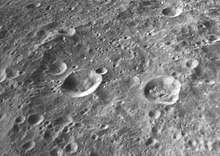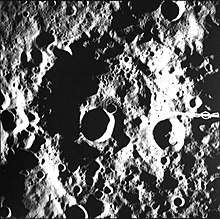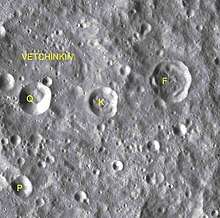Vetchinkin (crater)
Vetchinkin is an eroded lunar impact crater. It is located to the west-northwest of the huge walled plain Mendeleev, on the far side of the Moon. To the west-northwest of Vetchinkin lies the crater Meshcherskiy and to the south-southeast lies Green.

 | |
| Coordinates | 10.2°N 131.3°E |
|---|---|
| Diameter | 98 km |
| Colongitude | 230° at sunrise |
| Eponym | Vladimir Vetchinkin |
This crater is heavily worn and eroded, and little remains of the original outer rim. The satellite crater Vetchinkin K falls across the eastern side of the rim, and Vetchinkin Q forms a small but prominent crater in the southwestern part of the floor. The remainder of the crater interior is marked by various small craterlets and minor impacts, and there is little to distinguish this feature from the surrounding battered terrain.
Naming
The crater is named after the Russian physicist and engineer Vladimir Vetchinkin. Prior to naming in 1970 by the IAU,[1] this crater was known as Crater 215.[2]
Satellite craters
By convention these features are identified on lunar maps by placing the letter on the side of the crater midpoint that is closest to Vetchinkin.
| Vetchinkin | Latitude | Longitude | Diameter |
|---|---|---|---|
| F | 10.0° N | 134.0° E | 30 km |
| K | 9.6° N | 132.3° E | 22 km |
| P | 7.7° N | 130.3° E | 17 km |
| Q | 9.6° N | 130.7° E | 23 km |

References
- Vetchinkin, Gazetteer of Planetary Nomenclature, International Astronomical Union (IAU) Working Group for Planetary System Nomenclature (WGPSN)
- Lunar Farside Chart (LFC-1A)
- Andersson, L. E.; Whitaker, E. A. (1982). NASA Catalogue of Lunar Nomenclature. NASA RP-1097.CS1 maint: ref=harv (link)
- Bussey, B.; Spudis, P. (2004). The Clementine Atlas of the Moon. New York: Cambridge University Press. ISBN 978-0-521-81528-4.CS1 maint: ref=harv (link)
- Cocks, Elijah E.; Cocks, Josiah C. (1995). Who's Who on the Moon: A Biographical Dictionary of Lunar Nomenclature. Tudor Publishers. ISBN 978-0-936389-27-1.CS1 maint: ref=harv (link)
- McDowell, Jonathan (July 15, 2007). "Lunar Nomenclature". Jonathan's Space Report. Retrieved 2007-10-24.CS1 maint: ref=harv (link)
- Menzel, D. H.; Minnaert, M.; Levin, B.; Dollfus, A.; Bell, B. (1971). "Report on Lunar Nomenclature by the Working Group of Commission 17 of the IAU". Space Science Reviews. 12 (2): 136–186. Bibcode:1971SSRv...12..136M. doi:10.1007/BF00171763.CS1 maint: ref=harv (link)
- Moore, Patrick (2001). On the Moon. Sterling Publishing Co. ISBN 978-0-304-35469-6.CS1 maint: ref=harv (link)
- Price, Fred W. (1988). The Moon Observer's Handbook. Cambridge University Press. ISBN 978-0-521-33500-3.CS1 maint: ref=harv (link)
- Rükl, Antonín (1990). Atlas of the Moon. Kalmbach Books. ISBN 978-0-913135-17-4.CS1 maint: ref=harv (link)
- Webb, Rev. T. W. (1962). Celestial Objects for Common Telescopes (6th revised ed.). Dover. ISBN 978-0-486-20917-3.CS1 maint: ref=harv (link)
- Whitaker, Ewen A. (1999). Mapping and Naming the Moon. Cambridge University Press. ISBN 978-0-521-62248-6.CS1 maint: ref=harv (link)
- Wlasuk, Peter T. (2000). Observing the Moon. Springer. ISBN 978-1-85233-193-1.CS1 maint: ref=harv (link)
External links
| Wikimedia Commons has media related to Vetchinkin (crater). |